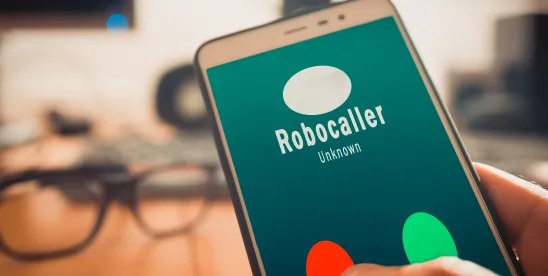The Federal Communications Commission (FCC) has become the latest federal agency to examine the impact and role of artificial intelligence (AI) technologies. On Aug. 8, the FCC released a Notice of Proposed Ruling (NPRM) and Notice of Inquiry (NOI) proposing to establish requirements for AI-generated calls and text messages, and to further explore the risks and benefits of AI technology in the robocall space. Comments will be received in the coming months.
This proceeding follows actions the agency took earlier in 2024 in response to a “deepfake” campaign targeting New Hampshire voters using AI-generated voice cloning to mimic the voice of President Joe Biden. In response, the FCC issued a declaratory ruling that artificial calls and texts using AI technology are prerecorded messages under the Telephone Consumer Protection Act (TCPA) and must have prior express consent. The Commission also proposed multimillion-dollar fines against both the party originating the fraudulent calls and the carrier that enabled them. In August, the carrier settled the enforcement action and agreed to pay a $1 million fine.
Building on these actions, this NPRM proposes a number of rule changes for calls generated with AI technology. Specifically, the FCC proposes the following:
- Define AI-Generated Calls – The Commission proposes to define an “AI-generated call” as “a call that uses any technology or tool to generate an artificial or prerecorded voice or a text using computational technology or other machine learning, including predictive algorithms, and large language models, to process natural language and produce voice or text content to communications with a called party over an outbound telephone call.”
- AI-Generated Call Disclosure – The Commission proposes to require callers making AI-generated messages to obtain consent for such calls via a clear and conspicuous disclosure that the consumer’s consent to receive artificial and prerecorded calls or texts may include consent to receive AI-generated calls or texts. The Commission also proposes to require callers using an AI-generated voice to, at the beginning of each call, clearly disclose to the called party that the call is using AI-generated technology.
- Promoting Access to Telephone Service by Individuals with Disabilities – The Commission proposes to exempt from the TCPA’s requirements artificial or prerecorded calls made by an individual with a speech or hearing disability using AI technology designed to facilitate the ability or such individuals to communicate over the telephone.
In addition to these proposed rule changes, the FCC seeks additional information in the Notice of Inquiry phase of its examination. A Notice of Inquiry is used to gain background information and suggestions for FCC action to inform potential future rulemakings or orders. The NOI seeks comment on the presence or potential for AI technologies that can detect potentially fraudulent or AI-generated calls based on real time analysis of voice call content or can block future voice calls that can be identified as fraudulent or AI-generated. The Commission also seeks comment on the privacy implications of these technologies. Specifically, the NOI:
- Seeks comment on the development and availability of technologies at either the device or network level that can:
- detect incoming calls that are potentially fraudulent and/or AI-generated based on real time analysis of voice call content;
- alert consumers to the potential that such voice calls are fraudulent and/or AI-generated; and
- potentially block future voice calls that can be identified as similar AI-generated or otherwise fraudulent voice calls based on analytics.
- Seeks comment on the privacy implications of call detection technologies that analyze the content of calls in real time to identify calls that are potentially fraudulent and/or feature AI- generated voice.
- The FCC believes that these tools pose significant privacy risks, insofar as they appear to rely on analysis and processing of the content of calls – which are very sensitive data – by application or device providers.
- Considers whether it should adopt rules governing the use of call detection, alerting, or blocking technologies to protect the privacy of callers and called parties.
Next Steps
The FCC will take comment from the interested public upon publication of its proposals in the Federal Register. Parties interested in commenting upon the connection between AI technologies and robocalls may contact us for more information.
The FCC has not identified a deadline for action on the NPRM and NOI, but under the current chairwoman, the Commission has been very active on robocall and robotext issues. Further action in early 2025 is not out of the question. Moreover, the FCC stated its intent to continue to explore AI regulation and develop new rules as the use of AI technology to make fraudulent calls grows.
Outside of robocalls, the FCC also is reviewing the use of AI in political ads on broadcast media. At its July public meeting, the Commission adopted, by a 3-2 vote along party lines, an order proposing to amend its broadcast rules to require disclosure of the use of AI in political ads on radio or television. This proposal – which was opposed by the Republican members of the FCC as ill-conceived and politically motivated – is in the comment process through mid-October. Previously, the FCC chairwoman indicated her intention to complete the rulemaking by Election Day in November.









 />i
/>i

